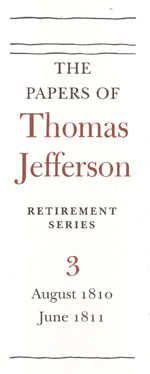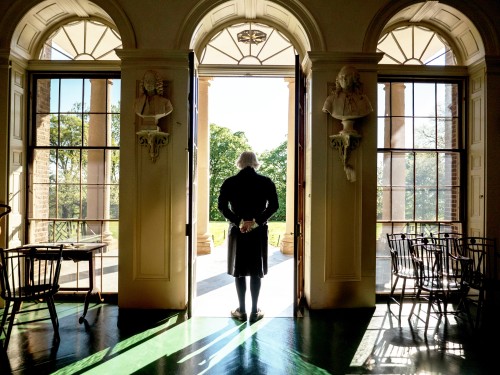 The 567 documents printed in this volume cover the period from 12 August 1810 to 17 June 1811. Thomas Jefferson was now ensconced in retirement at Monticello and Poplar Forest. His papers address a beguiling diversity of agricultural, local, legal, intellectual, and political topics. In February 1811, for example, Jefferson produced a detailed draft constitution for an agricultural society, abstruse astronomical calculations, notes on plantings at Poplar Forest, and estimates of the cost of shipping flour. Nonetheless, political and legal affairs dominated his correspondence during this period, with the controversy over the 1807 federal seizure of the Batture Sainte Marie at New Orleans looming particularly large. In preparing for his defense against Edward Livingston's lawsuit, Jefferson corresponded frequently with his legal team of George Hay, Littleton W. Tazewell, and William Wirt, as well as President James Madison, Secretary of the Treasury Albert Gallatin, Attorney General Caesar A. Rodney, Orleans territorial governor William C. C. Claiborne, and New Orleans mayor James Mather. Accompanying this correspondence are numerous enclosures bolstering Jefferson's legal position. He relied heavily on the brief prepared by Louis Moreau Lislet, which is summarized at length in this volume. This exchange of information supported the February 1811 filing by counsel of six pleas of not guilty and one motion to dismiss the case.
The 567 documents printed in this volume cover the period from 12 August 1810 to 17 June 1811. Thomas Jefferson was now ensconced in retirement at Monticello and Poplar Forest. His papers address a beguiling diversity of agricultural, local, legal, intellectual, and political topics. In February 1811, for example, Jefferson produced a detailed draft constitution for an agricultural society, abstruse astronomical calculations, notes on plantings at Poplar Forest, and estimates of the cost of shipping flour. Nonetheless, political and legal affairs dominated his correspondence during this period, with the controversy over the 1807 federal seizure of the Batture Sainte Marie at New Orleans looming particularly large. In preparing for his defense against Edward Livingston's lawsuit, Jefferson corresponded frequently with his legal team of George Hay, Littleton W. Tazewell, and William Wirt, as well as President James Madison, Secretary of the Treasury Albert Gallatin, Attorney General Caesar A. Rodney, Orleans territorial governor William C. C. Claiborne, and New Orleans mayor James Mather. Accompanying this correspondence are numerous enclosures bolstering Jefferson's legal position. He relied heavily on the brief prepared by Louis Moreau Lislet, which is summarized at length in this volume. This exchange of information supported the February 1811 filing by counsel of six pleas of not guilty and one motion to dismiss the case.
Jefferson inserted himself into political affairs both great and small during this period. In November 1810 he asked William B. Giles and John Wayles Eppes to intervene in any batture-related debates in the House of Representatives, lest Livingston's "assiduities and intrigues" induce Congress to legitimize his claim by referring it to commissioners. Jefferson urged Eppes to advocate the invasion of West Florida before it fell into British hands. When Justice William Cushing passed away he called for the "appointment of a decided republican" to counterbalance the Federalist philosophy that he regarded as ingrained on the Supreme Court. Jefferson sought to assist William Duane, who was embroiled in controversy because of his vehement published attacks on Gallatin and, implicitly, the Madison administration. Jefferson looked to rehabilitate both Duane's finances and his Republican sympathies by appealing to Richmond Republicans for support. When he learned from William Wirt that no help would be forthcoming, Jefferson chastised Duane, arguing that his increasingly strident assaults on Gallatin were jeopardizing party unanimity. Similarly, he praised James Monroe's January 1811 election as governor of Virginia as a sign of harmony within the Republican ranks, and welcomed his subsequent appointment as United States secretary of state even as he worried that the removal of Robert Smith from the Cabinet threatened party unity.
During this period Jefferson also commented on political philosophy. In August 1810 he endorsed Destutt de Tracy's reflections on Montesquieu's Spirit of the Laws, portions of which appear in this volume, and he spent the next several months working with Duane to get it published. Jefferson reviewed the translation and supplied a preface anonymously praising the book as an important corrective to positions by Montesquieu that he questioned, even if he privately was not persuaded by all of Destutt de Tracy's points. In a letter to Destutt de Tracy he particularly argued against the latter's preference for a plural executive. Jefferson suggested to John B. Colvin that during emergencies presidents and military leaders must act even without obtaining prior consent from Congress. Without using Jefferson's name, Colvin included portions of this letter in memoirs he ghost-wrote for James Wilkinson to vindicate the latter's behavior in New Orleans with respect to Aaron Burr's expedition. Finally, Jefferson described the political and philosophical divisions between himself and John Adams in a letter advising Benjamin Rush of his openness to rekindling the dormant friendship.
Closer to home, Jefferson found himself embroiled in a dispute with the Rivanna Company over its asserted right to expand Jefferson's dam in front of Shadwell Mills. The company also wanted to use his canal and suspend mill operations while they added to the dam. These issues led to extensive correspondence with Peter Minor, the company's treasurer, as well as with Monroe. An initial compromise to resolve the controversy proved to be only the opening act in what would become a long-running dispute.
Slaves and slavery are a recurring theme. In January 1810 a hired slave named Tom Buck ran away rather than reporting to Jefferson. He returned in February with severe frostbite, and over the course of this volume Jefferson corresponded with William Chamberlayne, Buck's owner, and Doctor Charles Everette regarding the cost and pace of Buck's recuperation. He also commented to King George County planter Nathaniel Hooe on the unfortunate death of Edmund, another hired slave who suffered from what was described as a "hernia." To John Lynch, meanwhile, Jefferson revealed his thoughts on the colonization of freed American slaves. Finally, after visiting Monticello and talking with Jefferson's neighbors, Elijah Fletcher wrote a letter giving a distinctly unflattering portrayal of the ex-president's standing in the community and relations with his slaves.
Volume 3 available through:
UVA Press Rotunda (index included; subscription required)
Founders Online (index omitted; no subscription required)
COPYRIGHT NOTICE: Published by Princeton University Press and copyrighted, ©, by Princeton University Press. All rights reserved. No part of this book may be reproduced in any form by any electronic or mechanical means (including photocopying, recording, or information storage and retrieval) without permission in writing from the publisher, except for reading and browsing via the World Wide Web. Users are not permitted to mount this file on any network servers.
